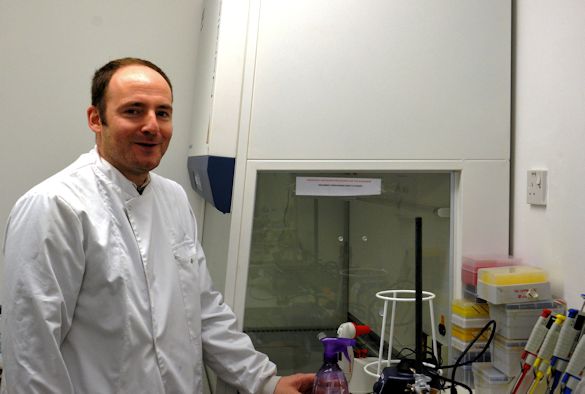New Centre for Plasma Microbiology announced
Published on

The University is to establish a new Centre for Plasma Microbiology which will focus on the development of novel plasma based physical interventions to prevent biofilm formation on medical devices.
The new Centre is one of nine projects funded through the Engineering and Physical Sciences Research Council (EPSRC) Healthcare Technologies Challenge Awards, a new scheme to improve healthcare diagnosis and treatment to address unmet healthcare needs.
Dr James Walsh, from the Department of Electrical Engineering & Electronics will head up the new Centre. His research focuses on non-thermal atmospheric pressure plasma, a unique state of matter that has exotic physical and chemical properties.
Related applications
By developing advanced plasma sources, Dr Walsh and his team have been able to exploit these unique features and apply cold plasma technology across a number of manufacturing, environmental and biomedical related applications.
Dr Walsh said: “There is an unprecedented clinical need to establish new strategies to manage the colonisation of medical devices by complex bacterial communities “biofilms”.
“Such contamination presents a particularly resilient reservoir of infection, shielded from antibiotics, that often leads to the emergence of multidrug-resistant colonies.
“The new Centre will act as a hub to facilitate new methodologies and technologies in this area and will be the catalyst to realise new potential and open up new scientific horizons. In collaboration with Public Health England it will bring together leading researchers from academia and industry to address the issue of biofilm contamination from different perspectives.”
“This funding confirms Liverpool’s position as a leader in the field of antimicrobial management.”
Life Sciences Minister, George Freeman, said: “From fertility diagnostics to disease detection, these award-winning projects - supported by Government's £6bn annual science budget - are great examples of how interdisciplinary collaboration can achieve game-changing results. By linking patients, technologists, clinicians and scientists, new tools and techniques to improve healthcare can be truly innovative which is why the UK is a world leader in life sciences.”
EPSRC’s Chief Executive, Professor Philip Nelson, said: “These Healthcare Technologies Challenge Award winners are our future research leaders who will be instrumental in ensuring the UK can meet the 21st century healthcare needs and thrive as a healthy nation.”
